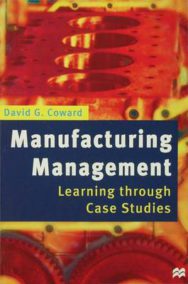
ABOUT THIS BOOK
PUBLISHER: Palgrave Macmillan
FORMAT: Paperback
ISBN: 9780333647776
RRP: £38.99
PAGES: 216
PUBLICATION DATE:
January 1, 1998
BUY THIS BOOK
As an Amazon Associate and Bookshop.org affiliate we earn from qualifying purchases.
Manufacturing Management: Learning Through Case Studies
David G. Coward
This work offers an insider’s view of changes in industrial operation that should bring about increased performance through the reduction of waste and delay. Each of the ten case studies in the book follows a similar pattern that links theory with practical application and involves the reader in devising solutions to the problems posed. The “real” solutions adopted in each case are presented finally, together with the outcomes obtained, in order to assist and reinforce the reader’s learning. In engineering management, the resources of manpower, materials and machines need attention in order to achieve competitive advantage. In this case study approach, some relevant theory is provided with an analysis of the strengths and weaknesses for application. The challenge for the reader is to improve the current situation, given the facts that have been identified. All the cases are open-ended, so the actual changes adopted with outcomes obtained are included, thus facilitating comparisons.The cases cover topics such as strategy formulation, management structure, cost estimation, production control and delivery, productivity, assembly line output, investment decisions, management information decisions, quality systems, health and safety aspects, TQM and continuous improvement, and measuring and monitoring results.
David G. Coward
D.G. COWARD originally served a five-year apprenticeship in heavy industry, then held various posts in operational control before entering higher education. He obtained his BSc via a sandwich course; he then studied operational attitudes of management for his MSc. His research and consultant activities have involved start-up problems for manufacturing, quality assurance for small companies and the induction of newly qualified engineers into industry. He recently retired as Principal Lecturer at the University of Central England in Birmingham.









